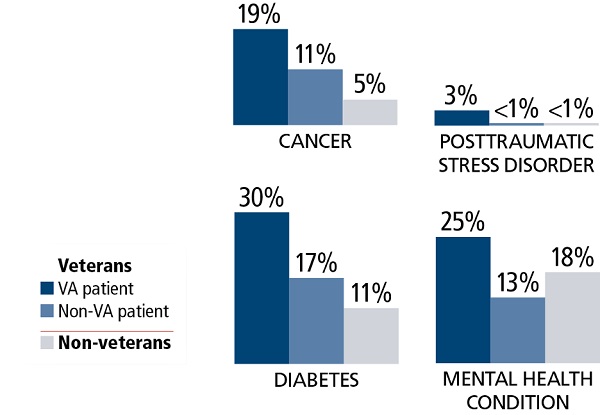Veterans deserve their health care benefits
5 min read
by Marty Wilde
Veterans often do not get the health care benefits they have earned through their military service. Only about 30% receive healthcare from the Veterans Administration, although many more qualify. Those not receiving healthcare benefits often have been unfairly denied or are have been assigned a low priority and never get care. Most veterans face an uphill battle to get the care they have earned through their service.
Who are veterans? A veteran is a person who served in the military service and separated with a service characterization other than dishonorable. According to the most recent US census data, about 16.5 million veterans live in the US, including about 290,000 in Oregon. They represent about 5% of the US population. Since 2000, the number of veterans has declined about a third as veterans from World War II and Korea pass on.
About 25% of all veterans have a service-connected disability rating, and that number climbs to 39% for post-9/11 veterans. Of the roughly 4 million veterans who have a disability rating, about 2.5 million have a disability rating of 50% or higher, and get free healthcare. Unfortunately, veterans are, on average, sicker than the general population.
Recent efforts to expand healthcare for veterans have not always been successful. Congress passed the PACT Act in August, theoretically providing healthcare benefits to 3.5 million veterans exposed to burn pits and other environmental toxins like Agent Orange. (I’m one of them.) However, veterans with persistent health problems will continue to struggle with the VA to get benefits. The VA has always been a “good soldier” when the federal government issues calls for agencies to control costs. Unfortunately, the VA does this by restricting services to veterans. It fails to represent veterans adequately in the budget battles, and instead consistently underestimates their needs, delays recognizing their specialized healthcare problems, and denies benefits to those entitled to them at an astounding rate.
The VA does a poor job adjudicating the claims, often wrongfully denying veterans their benefits. If history is any guide, about half of the over 125,000 veterans who have already applied for VA disability benefits under the PACT Act will have their claims denied, despite a legal presumption that many of their health concerns are related to their service. One law firm representing veterans claims that the VA only grants 32.5% of initial disability claims.
Fortunately, the odds are better on appeal. The Board of Veterans Appeals (BVA) grants 70% of appeals to some degree; a figure that rises to 85% for veterans represented by an attorney. Despite high success rates and a congressional mandate for the VA to rush these appeals, veterans represented by an attorney may pay up to a third of their back benefits in legal fees. The Board of Veterans Appeals is resourced to adjudicate about 100,000 appeals a year, but has a backlog of about 200,000 claims. The good news is that the backlog is down from close to 500,000 claims 5 years ago. The bad news is that progress on eliminating that backlog has stagnated. One-third of the benefit and an average of over two years to get a decision is a steep price in both time and money to get the benefits a veteran has earned through service.
A patchwork of organizations help veterans in get their benefits. The State of Oregon uses lottery funds to pay for free access to County Veterans Service Officers, who help veterans apply for their benefits. The VFW, DAV, and American Legion do the same from private funds. Organizations like the National Veterans Legal Services Program (NVLSP) provide appellate representation free of charge, but are dependent on philanthropy to keep their doors open. Lawyers volunteer to help vets for free through the Lawyers Serving Warriors program and other similar efforts. These contributions are welcome, but barely meet the need.
We can do more to support veterans. Despite a statutory requirement to assist veterans in the non-adversarial claims process, VA persists in denying claims at a high rate, failing to request adequate resources for the claims process to meet the statutory deadlines to respond to claims, and refusing to ask Congress for sufficient funds to provide healthcare for all priority groups. Even Veterans Law Judges at the VA have objected to VA’s failure to provide them what they need to handle all the appeals in a just and timely manner.
VA leadership should be held accountable. Neither Democratic nor Republican administrations seem interested in insisting that the VA meet its duties to veterans; neither party will request the funds from Congress to do so. Congress should also allocate funding to support nonprofits like the National Veterans Legal Services Program that provide services to veterans for free, and not require them to rely on private donations and volunteer lawyers. In Oregon, we largely use the state funds provided by the Legislature to force the VA to do the right thing for veterans.
When I was a claims officer for the Air Force, I often had to tell the paralegals adjudicating airmen’s claims for compensation, “Remember, it’s not your money—the claimant has earned it!” No large constituency seriously opposes benefits for veterans, but the Veterans Benefit Administration continues to act more like an insurance company protecting private assets than an agency dedicated to veterans’ welfare. This stands in contrast to the Veterans Health Administration, the healthcare arm of the VA. As one of the veterans lucky enough to actually receive the healthcare I’ve earned from them, I see how much they care about me and other veterans. Moving forward, I hope we can have the same culture change when it comes to awarding veterans the benefits they have earned.
Good News for Veteran Dental Care
Veterans do not receive dental care from the VA unless they sustained a dental injury on duty or have a 100% service-connected disability rating. This results in fewer than 600,000 veterans nationwide receiving dental care through the VA each year. Rep. (now Senator-Elect) Cedric Hayden authored HB 4095, a bipartisan bill that started a free state dental benefit for veterans making under 400% of the federal poverty line on November 1. This bill passed with bipartisan support. For details on how to sign up, go to https://www.oregon.gov/odva/Benefits/Pages/Dental.aspx .
Giving Tuesday
If you are able, I hope you will consider joining me in making a donation to a worthy cause this Giving Tuesday. Some of my favorites include National Veterans Legal Services Program, Refugee Resettlement Coalition of Lane County (CCS), and Egan Warming Centers (St. Vincent de Paul).
Rep. Marty Wilde represents Oregon House District 11. Contact him by email at wildefororegon@gmail.com.







